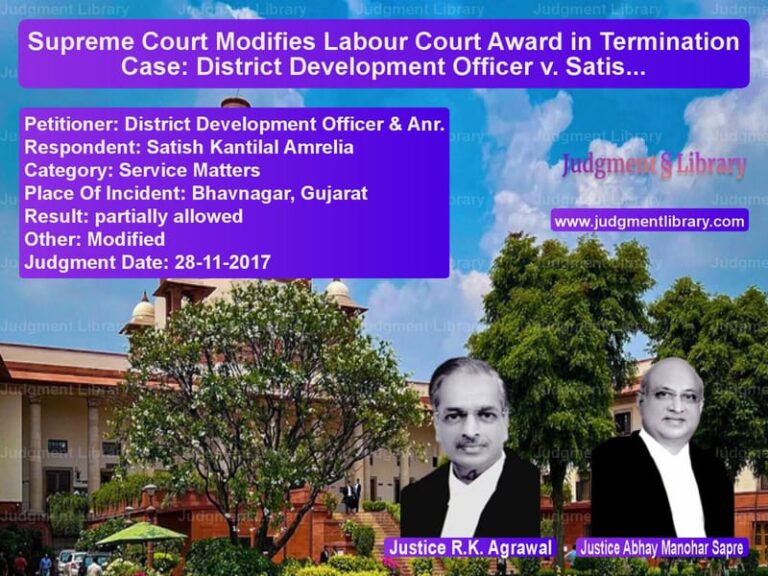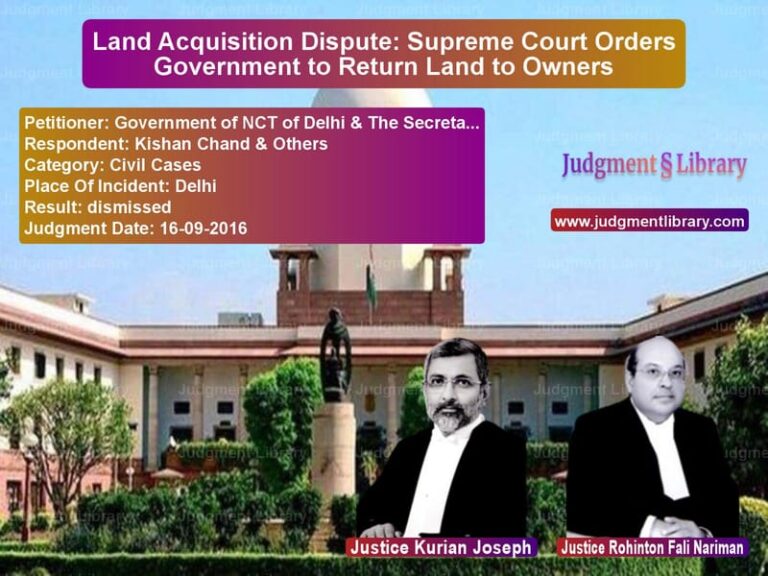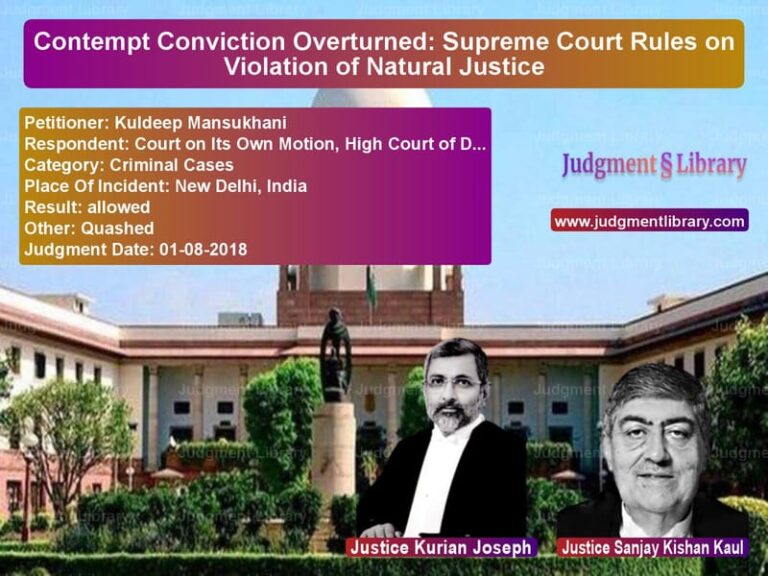Supreme Court Grants Relief to Bihar Panchayat Teachers in Evaluation Test Dispute
The Supreme Court of India, in the case of Nirmala Kumari & Ors. vs. State of Bihar & Ors., delivered a crucial judgment on October 31, 2017, regarding the removal of Panchayat teachers in Bihar who failed an evaluation test. The Court ruled that the affected teachers should be given another opportunity to undergo six months of training and a re-evaluation before termination, thereby providing them with a fair chance to continue their employment.
The case arose after the State of Bihar decided to remove thousands of Panchayat teachers who had failed an evaluation test conducted under the Bihar Panchayat Primary Teacher (Employment and Service Conditions) Rules, 2006. The affected teachers challenged this decision, arguing that the evaluation test was originally intended only for increments and not as a criterion for termination. The case was heard by the Supreme Court after multiple appeals from the High Court of Patna.
Petitioner’s Arguments
The petitioners, a group of affected Panchayat teachers, contended that:
- The evaluation test was introduced for increments and not as a qualifying test for termination.
- Under the original 2006 Rules, untrained candidates could be appointed as teachers, and the evaluation process did not mandate termination for failure.
- The removal of teachers for failing the evaluation test violated their right to livelihood and was unfair to those who had served in the education sector for several years.
- The introduction of the Right to Education Act, 2009, led to changes in teacher qualifications, but those already employed should have been given adequate training before being tested.
- The government’s decision to conduct the evaluation test without offering proper training amounted to arbitrary action.
Respondent’s Arguments
The respondents, including the State of Bihar, argued that:
- The education system had undergone a transformation under the Right to Education Act, 2009, requiring higher standards for teachers.
- The evaluation test was introduced to ensure that only qualified individuals were allowed to continue in service.
- The amended rules allowed for a limited number of attempts, and those who failed after three chances were to be removed from service.
- The state was justified in implementing measures to improve the quality of education in government schools.
- The government had already provided multiple opportunities for teachers to qualify, and further relaxation would compromise education standards.
Key Observations by the Court
The Supreme Court acknowledged the need for qualified teachers but also emphasized the importance of fairness in employment policies. The bench observed:
“The evaluation test was originally intended for the purpose of increment, but we find from the rules that the teachers who were appointed prior to the introduction of the new scheme are to be given training. It is not clear as to whether the appellants herein, who have been appointed prior to the introduction of the Right to Education Act, have been given the training before subjecting them to the evaluation test.”
The Court further noted:
- The petitioners were appointed under a different legal framework that did not mandate passing an evaluation test for continued employment.
- The state had a responsibility to ensure that all teachers received adequate training before testing them.
- The decision to terminate teachers without providing necessary training was unfair and needed reconsideration.
- Education reforms should be implemented in a manner that balances quality improvement with fairness to existing employees.
Final Judgment
The Supreme Court ruled:
“In order to give a quietus to the whole issue, it is only appropriate that the State is directed to subject the teachers, who have failed in the evaluation test for the third time, to a further training of six months. At the end of such six months, they shall be subjected to an appropriate evaluation test, prescribing minimum marks.”
The Court clarified:
“Passing the evaluation test thus conducted, on completion of the training, would mean the successful completion of the training. If any of the candidates fail to successfully complete the training as above, it will be open to the State to remove them from the service.”
Implications of the Judgment
This ruling has several significant implications:
- It prevents immediate mass termination of Panchayat teachers and allows them a final opportunity to meet the required standards.
- It ensures that teachers are given adequate training before being subjected to qualification tests.
- It balances the need for quality education with employment security for existing teachers.
- It sets a precedent for similar cases where employees face termination due to changes in qualification requirements.
- It reinforces the principle that procedural fairness must be maintained in government employment policies.
Conclusion
The Supreme Court’s ruling in this case provides relief to thousands of Panchayat teachers in Bihar while ensuring that education quality is not compromised. By mandating additional training before re-evaluation, the Court has upheld the principles of fairness and justice in employment decisions.
Going forward, this judgment will serve as a benchmark for similar cases where employees face new qualification standards. It also underscores the importance of gradual implementation of education reforms, ensuring that teachers are given a fair chance to meet new requirements before facing termination.
Don’t miss out on the full details! Download the complete judgment in PDF format below and gain valuable insights instantly!
Download Judgment: Nirmala Kumari & Ors vs State of Bihar & Ors Supreme Court of India Judgment Dated 31-10-2017.pdf
Direct Downlaod Judgment: Direct downlaod this Judgment
See all petitions in Employment Disputes
See all petitions in Public Sector Employees
See all petitions in Recruitment Policies
See all petitions in Judgment by Kurian Joseph
See all petitions in Judgment by R. Banumathi
See all petitions in partially allowed
See all petitions in Remanded
See all petitions in supreme court of India judgments October 2017
See all petitions in 2017 judgments
See all posts in Service Matters Category
See all allowed petitions in Service Matters Category
See all Dismissed petitions in Service Matters Category
See all partially allowed petitions in Service Matters Category







